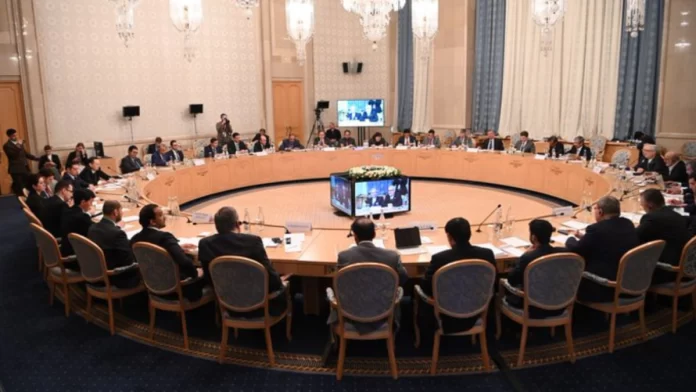The multilateral ‘Moscow Format’ of nations are to hold their upcoming annual meeting in Russia’s Kazan on September 29 and aims to eradicate terrorism and drug trafficking while stressing the importance of forming a truly inclusive government, reflecting the interests of all major ethnopolitical groups of the country. The Taliban are expected to attend after missing 2022’s discussions.
The Moscow Format was established in 2017 as a regional platform for consultations between special envoys of Russia, Afghanistan, India, Iran, China, and Pakistan to promote peace, stability and facilitate national reconciliation in war-ravaged Afghanistan. Later, five Central Asian nations, Kazakhstan, Kyrgyzstan, Tajikistan, Turkmenistan and Uzbekistan joined the diplomatic outreach.
The main emphasis this year will be the formation of an inclusive Afghani government. The Taliban are just one of over 50 tribal groups in Afghanistan but represent about 55% of the total Afghani population. The Taliban have stated they will permit a more representative Afghan government, but this has not materialized at present.
The 2022 joint statement of the country representatives in the Moscow Format noted that while efforts to provide economic and humanitarian assistance to Afghanistan should be intensified, it was important for the country’s interim government to “ensure the basic rights and freedoms” of the people. Zamir Kabulov, the Russian special envoy for Afghanistan, has stated that the upcoming meeting in Kazan will emphasize on the inclusivity of the interim Taliban government, counterterrorism and crimes linked to the narcotics trade that was estimated to be worth over US$2.7 billion in 2021. He expressed concerns that there have been “no progress” on these matters.
Zabihullah Mujahid, a spokesperson for the Taliban government, acknowledged the importance of the meeting as differences between Afghanistan and other countries can be resolved through dialogue, stating that “At the meetings, there should be a spirit of cooperation with Afghans and resolving conflicts through dialogue. Afghanistan prefers that all problems, concerns, or demands should be shared with us and discussed directly.”
The Taliban seized power in August 2021, amid the chaotic withdrawal of the US troops from the country, marked with images of thousands of Afghans rushing to the international airport in Kabul to flee the country, with some of them clinging to the sides of US military aircraft during taxi and take off.
Currently neighboring Pakistan, as well as Saudi Arabia and the United Arab Emirates remain the only countries that recognize the Taliban government. Russia and India, however, are among a dozen nations that have diplomatic missions in Afghanistan.
India’s Minister of External Affairs Dr. Subrahmanyam Jaishankar had earlier said that New Delhi would keep its embassy open in Kabul but wouldn’t send an ambassador. Though India has been one of the leading donors for various developmental projects in Afghanistan, the largesse has dwindled since the Taliban returned to power.
In the current financial year 2023-24, India’s Finance Minister Nirmala Sitharaman allocated 2 billion rupees (US$24 million) for expenditure on grants and loans to Afghanistan, which remained unchanged from the previous year but was significantly lower than 3.5 billion rupees (US$42 million) in 2021-22, when ousted president Ashraf Ghani was in power.
China will be keen to see progress in Afghanistan as it wants to extend the Belt & Road Initiative linked China Pakistan Economic Corridor it has with Pakistan into Afghanistan and commence reconstruction activities. Afghanistan joined the BRI earlier this year, while Pakistan has laid out a “Development Road Map” for Kabul.
India wishes to see much-delayed progress on the proposed TAPI gas pipeline, while Pakistan and Uzbekistan will be wanting to see progress on the Trans-Afghan railway line. The Taliban will need to balance these projects against a perceived loss of some political influence over the country – a difficult balancing act that will make the Kazan event a watershed moment in Central Asian development.




